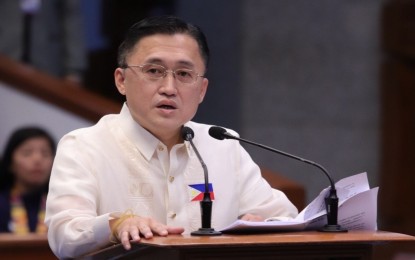
Senator Christopher Lawrence "Bong" Go
MANILA – Senator Christopher Lawrence "Bong" Go on Monday filed a measure seeking to institutionalize the transition of the government to the digital age amid the coronavirus disease (Covid-19) pandemic.
In filing Senate Bill No. 1738, or the proposed E-Governance Act of 2020, Go said the government’s transition to e-governance has been a long time coming.
"In an age where almost everything can be done online and through other digital platforms, the government must harness the power of information and communications technology to better serve its purpose and bring the government closer to the people," he said.
Go said the need to shift to e-governance is highlighted by the Covid-19 pandemic, which exposed gaps, “both foreseen and unforeseen,” in the delivery of government services in the country.
As the number of infected cases continues to increase, he said long queues and appointments with government agencies, financial institutions, and other public offices have worsened.
He added that major government social services and programs are also being forced to shut down, limiting the public's accessibility to public services at a time when the same are needed the most.
The lawmaker noted that a number of government agencies and local government units have already begun their own transitions to the digital age, offering online services to the public.
"The new normal warrants the government to consider and adopt, in a very radical but pragmatic way, the importance of digital transformation and use of electronic services and platforms to enable the government to do better," Go said.
“This bill takes into consideration what the government has learned from what has been and is being done, drawing from the experiences of technologically-advanced countries and the best practices of those who have started the push for e-governance, to initiate the country's first big step to an institutional and whole-of-government approach to digitizing governance for a better government and a safer future," he said.
Once enacted into law, SB 1738 mandates the government to establish an integrated, interconnected, and interoperable information and resource-sharing and communications network spanning the entirety of the national and local government, an internal records management information system, an information database, and digital portals for the delivery of public services.
The measure also pushes for the digitization of paper-based and other traditional modes of workflows for a more efficient and transparent public service.
Under the proposed measure, the heads of government agencies are mandated to comply with the requirements of the bill, including related standards for all ICT infrastructures, systems, equipment, designs, and other technologies promulgated by the Department of Information and Communications Technology (DICT).
The bill also mandates the DICT “to harmonize and coordinate” all national ICT plans and initiatives to ensure knowledge, information and resource-sharing, database-building, and agency networking linkages among agencies, consistent with e-government objectives.
It also provides for the establishment of the Integrated Government Network (IGN) which will act as the primary means for the sharing and communication of resources, information, and data through and on digital and electronic platforms across all of the government.
The IGN will also act as the government's primary and focal information management tool and communications network.
The measure mandates the creation of a corporate body to be known as Philippine Infostructure Management Corporation for the purpose of ensuring the proper and efficient operations and management of the country's ICT assets, as well as a training institution in recognition of the critical role of educating both the public and the government in ICT.
The need for the digitalization of government processes in the country amid the pandemic was among the legislative measures mentioned earlier by Senate President Vicente Sotto III during the opening of the second regular session of the 18th Congress.
"For as long as the pandemic remains uncontrolled, there will be a need to upgrade and improve the digital highway for support of various communications and support of transactional needs," Sotto said.
Go said SB 1738 will promote such transition to digitalization, eliminating delays and other problems associated with the traditional way of governance in communications and resource and information sharing.
He said the public will feel that the government is actually and truly at their fingertips.
“Due to the electronic nature of e-governance, service delivery to citizens will be facilitated in a more timely, cost-effective, and efficient manner. Filipinos will also be empowered through better access to government information with less bureaucratic delays,” he said.
He added that e-governance will help address issues such as red tape and corruption, brought about by convoluted bureaucracy, and the need for more transparency in government services.
“Nakita natin ang importansya ng (We have seen the importance of) digital transformation in government. Sa private sector, napilitan ang mga negosyo na mag-adopt ng (In the private sector, businesses were forced to adopt) e-commerce techniques para mapabuti ang mga serbisyo nila (to improve their services),” Go said.
“Lalo na sa gobyerno (Especially in government), there’s no better time than now to prioritize the government's digital transformation,” he said. (PNA)
